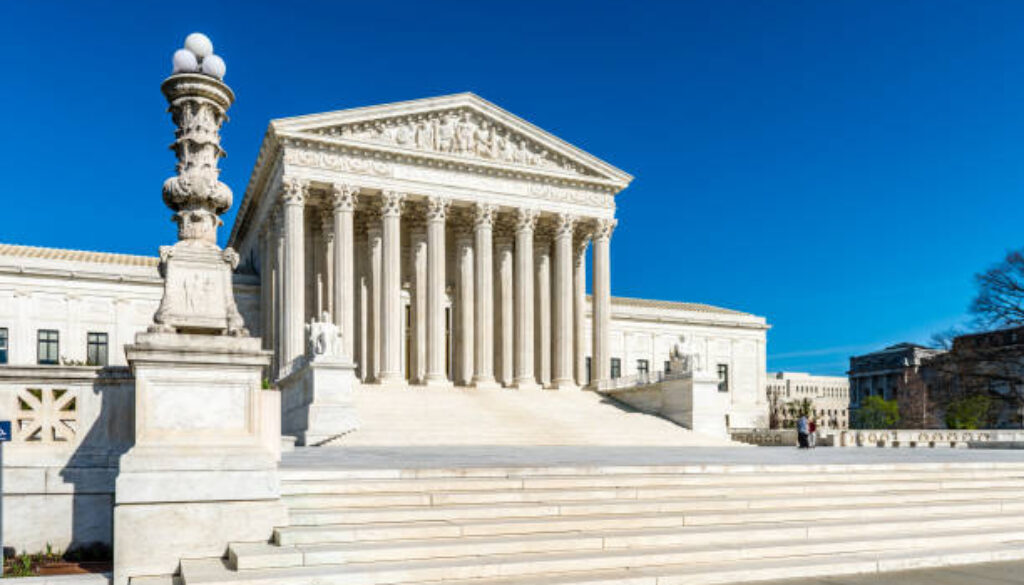Supreme Court ruling in EPA case sparks fear in environmental advocates
The Supreme Court ruled Thursday to significantly limit the power of the Environmental Protection Agency (EPA) to regulate power plant greenhouse gases, a decision that environmental advocates fear will not only contribute to more harmful climate change, but also restrict other environmental regulation needed to protect health.
In its opinion in West Virginia v. EPA, the court’s 6-3 conservative majority said the EPA erred in claiming “unheralded” authority from an EPA rule finalized during President Barack Obama’s administration. That rule sought to shift the energy sector from coal-fired power plants to lower-emitting sources such as natural gas or other more environmentally friendly options, such as solar. Although the agency finalized the rule, it was prevented from going into effect.
That power “generation shifting” approach far exceeded the EPA’s regulatory discretion under the Clean Air Act, the Supreme Court opinion stated. Such a fundamental transformation of a major sector of the economy would require Congress to direct such regulation, the court ruled.
“Capping carbon dioxide emissions at a level that will force a nationwide transition away from the use of coal to generate electricity may be a sensible ‘solution to the crisis of the day.’” the opinion stated. “But it is not plausible that Congress gave EPA the authority to adopt on its own such a regulatory scheme.”
The ruling may lead to restrictions on how the EPA can write future rules, observers say.
“This is a significant decision in terms of not only EPA’s authority to regulate emissions on the basis of climate change under the Clean Air Act, but also potentially brings into question numerous other federal regulations,” Joel Johnston, a partner at law firm Hall Estill who specializes in environmental and regulatory issues, said in a statement.
“The ruling clearly curtails the EPA’s authority to regulate on the basis of climate concerns, so with Congress being what it is these days, it’s hard to see any clear path forward for EPA to regulate climate,” he said in the statement.
‘The stakes here are high’
Justice Elena Kagan wrote the dissent to the opinion, joined by Justice Sonia Sotomayor and now-retired Justice Stephen Breyer. Kagan countered that the air law gave the Obama EPA authority to regulate greenhouse gases from power plants as it had attempted, and that the majority erred by indicating it knows how to craft climate controls.
“The subject matter of the regulation here makes the Court’s intervention all the more troubling,” Kagan wrote. “Whatever else this Court may know about, it does not have a clue about how to address climate change. And let’s say the obvious: The stakes here are high.”
West Virginia and almost two dozen other states pursued the Supreme Court case, which followed a lengthy EPA rulemaking history. Those states opposed the Obama administration’s Clean Power Plan (CPP) to reduce utility green house gases.
The Trump administration’s EPA then rescinded that rule and replaced it with the much narrower Affordable Clean Energy (ACE) policy, prompting litigation from environmentalists seeking to overturn the ACE rule and the repeal of the CPP. A federal appeals court ultimately sided with environmentalists, leading to the Supreme Court case.
The Supreme Court ruling sends the issue of climate regulation back to the EPA. The Biden administration has been working on a next version of a power plant greenhouse gas rule, and it will now have to ensure that whatever it proposes conforms with the justices’ decision.
In a statement, EPA Administrator Michael Regan said, “While I am deeply disappointed by the Supreme Court’s decision, we are committed to using the full scope of EPA’s authorities to protect communities and reduce the pollution that is driving climate change. We will move forward to provide certainty and transparency for the energy sector, which will support the industry’s ongoing efforts to grow our clean energy economy.”
Environmentalists’ concerns
A decision to rein in the agency’s climate rulemaking power was expected following February 28 oral argument in the case, where several conservative justices expressed concerns about the EPA’s regulatory overreach. Still, it prompted outrage on Thursday from environmental and public health advocates.
“This decision gives coal executives and far-right politicians exactly what they asked for by frustrating EPA’s efforts to set strong, effective carbon pollution standards from power plants that would help protect our communities and families,” said Andres Restrepo, senior attorney for the Sierra Club’s Environmental Law Program.
Environmental Working Group President Ken Cook said: “Without strict EPA regulation of power plants, we’ll never succeed in the fight against the climate crisis.”
Cook warned that the decision creates an opening for attacks on provisions of the Clean Air Act and other laws.
Natural Resources Defense Council President Manish Bapna also said he worries that the ruling severely hampers how the EPA can write climate regulations.
“This leaves the EPA in the climate fight but makes it harder to win it,” Bapna said. “The ruling recognizes the EPA’s authority to limit the carbon pollution from the nation’s power plants, while narrowing the agency’s options for doing so.”
Unless Congress takes the unlikely step of agreeing to broad bipartisan legislation authorizing the EPA to establish a specific power plant greenhouse gas regulatory program, the agency has a much more limited path forward on how to write its climate rules – and that’s something the Biden administration’s critics are now welcoming.
‘We’re not done’
There was plenty of praise for the ruling, including a statement from West Virginia Attorney General Patrick Morrisey, who led the state coalition that urged the Supreme Court to limit the agency’s climate rulemaking authority.
“With Thursday’s ruling, EPA can no longer sidestep Congress to exercise broad regulatory power that would radically transform the nation’s energy grid and force states to fundamentally shift their energy portfolios away from coal-fired generation,” Morrisey said. “EPA must instead regulate within the express boundaries of the statute that Congress passed. We are pleased this case returned the power to decide one of the major environmental issues of the day to the right place to decide it: the U.S. Congress, comprised of those elected by the people to serve the people.”
Morrisey hinted at future litigation over other rules: “And we’re not done. My office will continue to fight for the rights of West Virginians when those in Washington try to go too far in asserting broad powers without the people’s support.”




July 11, 2022 @ 10:36 am
Well written article on pesticides informing public of dangerous risks, we as citizens have little say in avoiding. Cancer cases in Mississippi are going through the roof as an aging population have maxed out their immune systems to fight the man made toxins. Toxins ignored as a danger to health. Thanks for shedding some light using fact based studies that say we can no longer ignore the dangerous risks. I believe every cancer case medical bills should be paid for by those poisoning us, and those blindly ignoring us. As citizens we can’t help but breathe toxic air and drink some form of toxic liquid. Currently the profit of cancer in an aging population is also a lucrative incentive to ignore environmental change.